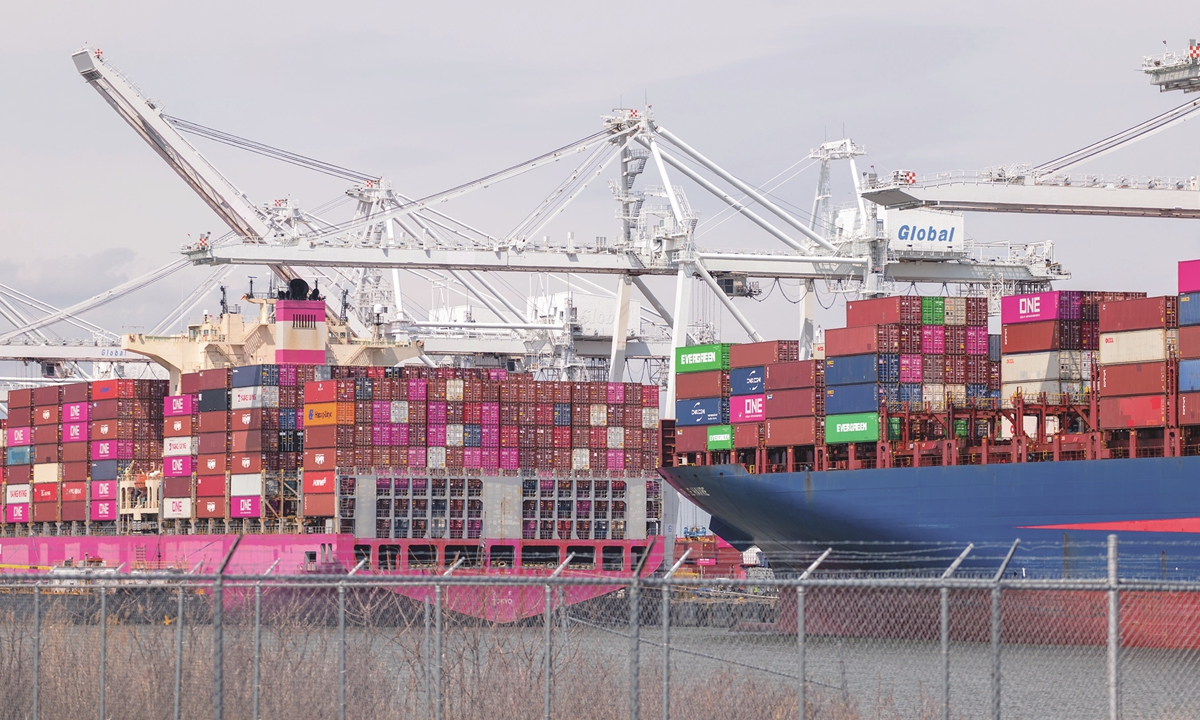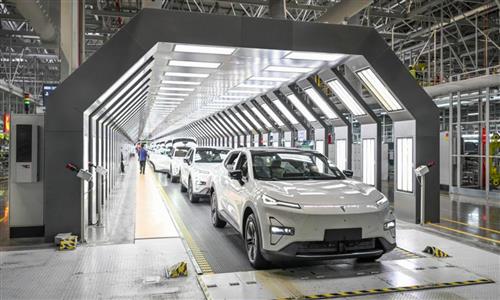
A view of cargo ships at Port Liberty in Bayonne, New Jersey, on April 10, 2025. Photo: VCG
Editor's Note:
Broad, hard-hitting tariffs announced by the US have triggered global alarm and anxiety. The game-changing move has put the global trade order in jeopardy. Last week, the US announced a 90-day tariff pause on dozens of countries while ratcheting up tariffs on Chinese imports to 145 percent. In contrast to the US government's erratic "random punches," China has consistently maintained a calm, composed and measured response, demonstrating to the world that it can withstand pressure, remain steady and shoulder great responsibility. In the eighth article of the "Wisdom on China&US" series, the Global Times gathered the opinions of three US experts on the absurdity of the US tariff policy and the havoc it has wreaked on the world.
Richard D. Wolff, professor of economics emeritus, University of Massachusetts, Amherst
The US tariff program is a key part of the country's attempt to cope with the intertwined declines of its empire and economy. The sudden, global and extreme nature of the tariffs reflects a desperation stemming from failed earlier coping efforts. This desperation is also evident in the unplanned, on-again-off-again imposition of tariffs, which disrupts world trade. The 90-day delay simply extends the uncertainty and consequent disruption.
Overwhelming military force and economic power have proven not to guarantee victory. Denial of the US decline became increasingly difficult, especially as China's economy has grown so much faster over recent decades. Frustration at the continued growth of China and BRICS, relative to the US and the G7, explains why the US imposes much higher tariffs on China than any other nation.
The tariffs aim to drain wealth from the rest of the world to help restore the empire. To that end, damaging old alliances - such as those with Europe, Canada, Mexico, Japan and others - has become a necessary cost. The idea of "taking" Greenland, Canada and Panama serves to compensate for the widespread feeling of a lost empire.
The US tariffs represent a significant state intervention in markets, rejecting the neo-liberal globalization, free trade and free market system that are perceived as "cheating" the US.
Because of its stunning growth, Chinese socialism has become a global model for countries prioritizing the escape from poverty and humiliation. To undo that reality, the US has resorted to extreme actions such as imposing tariffs. Ironically such extremes and their associated uncertainties may prompt more countries to reduce or eliminate their dependency on the US.
Sourabh Gupta, senior fellow at the Washington-based Institute for China-America Studies
The US tariffs violate the fundamental principles of non-discrimination and predictability, as well as other key provisions of the global trading system. In the past, the US was instrumental in establishing these principles and reaped great benefits from them. Now, its refusal to abide by them or submit to the WTO's full dispute settlement procedures represents a significant setback for the trading order.
The prevailing anxiety in US and global capital markets is a harbinger of the hardships that Americans will soon face at the grocery store checkout. For US consumers, there is little escape, as the government's tariff war goal - to eliminate the US bilateral trade deficit - is ultimately unwinnable. Wall Street analysts increasingly believe that the risk of a recession is rising. Wall Street does not lie, although it can sometimes overreact in moments of panic. However, officials in the US government, who claim that their protectionist measures will not significantly affect consumers and that the stock market will soon thrive, are essentially putting lipstick on a pig. US consumers will have to bear the consequences of these tariff policies, and foreign exporters will not be spared either. Overall, the trade war is a lose-lose proposition for everyone involved.
That said, if other major countries, such as China, Japan and South Korea, as well as major economic areas, such as the EU and Mercosur, can rededicate themselves to the principles and rules of the system, even in this era of activist industrial policy and national economic security, the trading order can be safeguarded. Then, the US will be left to observe from the outside. A short-term concern that needs to be mutually managed by these pro-trade countries is the effects of trade diversion stemming from America's protectionist walls.
The White House is mistakenly determined to maintain maximum leverage vis-à-vis China, hence its decision to increase tariffs to 145 percent and beyond. However, what it fails to understand is that Beijing has its own strategy - one in which countermeasures are assured, immediate and wide-ranging, including both tariff and non-tariff measures, but applied in measured quantities. The effect of China's response is to effectively neutralize the strategy behind the US tariff increases, which are intended to create leverage in subsequent bilateral negotiations aimed at forcing a significant reduction in the trade deficit. Given that China is the global leader in the production of intermediate goods, the US misuse of the tariff mechanism will reverberate worldwide, even when the final products are assembled in third countries far from China and then exported to the US.
John McCown, shipping expert and a non-resident senior fellow at the Center for Maritime Strategy
There seems to be a clear goal on the part of the current US administration: They appear to be uncomfortable with having a trade deficit. They tend to interpret a trade deficit as a transfer of value, which, to me, is a misunderstanding. For example, the US government refers to the trade deficit with China, which is around $500 billion a year, and implies that this means we're losing $500 billion while China is gaining $500 billion. That perspective ignores the fact that we're receiving $500 billion worth of goods in return.
I'm constantly reminded of this through my own purchases. I may be handing over cash for something produced overseas, but in return, I'm receiving a tangible good - something I clearly value at least as much as the money I spent. And I don't want to see that reduced.
By reducing the volume of trade, particularly imports, there's no question that it will lead to some job increases in the US. But my view has always been: What is the cost of those jobs?
Another basic certainty is that by imposing barriers, even temporary ones, and taking away the consumer's choice to buy and spend less on certain items, people will ultimately end up paying more. As a result, the US will experience inflation. We might not be importing as many goods, but we will actually be importing inflation, which isn't good.
I think it would be a terrible decision for the US to move away from trade. Frankly, I don't think any country has benefited more from global trade in the postwar period than the US. Yes, we run a large trade deficit, but we are also the issuer of the world's reserve currency. And mathematically, when you're the reserve currency, the global demand for your currency drives its value up - perhaps higher than it otherwise should be. That brings all sorts of advantages. Our leadership in world affairs is closely tied to our role in global trade. If we decide that we no longer value that role, trade will continue - but it will be to the detriment of the US.
Some people seem to have the notion that the US can bend everybody to its will because it is still the world's biggest economy, but this may not be accurate. I recently saw figures showing that since 2000, the US share of world trade has decreased by about 5 percent. The world is able to adapt.
The tariffs will have consequences, but perhaps less so than before, because China has become more diversified or has moved away from the US somewhat. That was probably a smart move. However, the more impact these policies have on us, the more they will also affect China. That's not going to be good for the Chinese economy, and it will likely raise tensions. I just hope we don't go through another cycle of escalation. But historically, that's what happens in a trade war. There's really no such thing as everyone coming out ahead in that scenario. I believe that everyone benefits from free trade.



